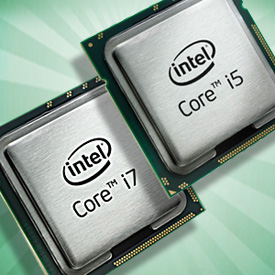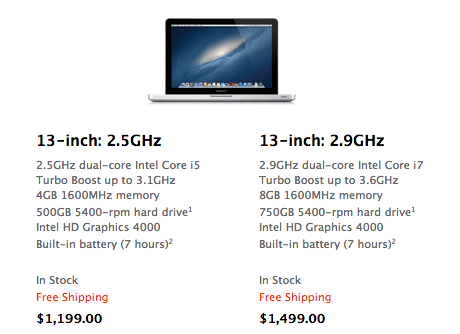Deciding Between an i5 vs i7 Processor: Is The i7 Worth The Extra Money?
 A pretty good chunk of the new computers being sold (or built) these days are using the Intel i5 or the i7 processor. The i5 costs less, but what is the real difference here – in plain English?
A pretty good chunk of the new computers being sold (or built) these days are using the Intel i5 or the i7 processor. The i5 costs less, but what is the real difference here – in plain English?
Does the extra dough you have to pony up for the i7 actually get you anything that you’re going to need?
Well, thanks to Intel, they didn’t exactly make it easy to figure out. 7 is a higher number, so a lot of people just base their decision on that alone. :) But, let’s take a peak at this here…
Differences Between Desktop i5 and i7
First, Intel went off and made it confusing by making their desktop and mobile versions of these processors different. So, let’s talk about the desktop first…
The Core i7 processor has more processor cache, higher clock speed, and hyper-threading. The processor cache just means that the processor can store more data internally, saving it from having to “re-think” things again. The end result is faster operation, especially for repetitive tasks. The higher clock speed is obvious (although not as much these days as it used to be. And, hyper-threading is a technology that is aimed at making multi-tasking a lot faster.
So, with all that, the i7 is better equipped for things like heavy multi-tasking, lots of multimedia (although we’re talking video editing and photo editing, not simply watching movies), heavy gaming, or data-crunching.
The i5 runs at a slightly lower clock speed and doesn’t include hyper-threading. Are you going to notice the lack of hyper-threading in the real world? Depends on what you do.
Basically, hyper-threading simply means the processor has the ability to process more than one thing at a time. Processors without hyper-threading (like the i5) cannot process more than one thing at a time. Sounds worse, but in reality, the processor is so fast anyway that you’ll never notice. So, for everyday tasks like office work, web browsing, email… you can run all those things at the same time without hyper-threading and you’ll never notice any difference at all. Where you will notice a difference is only with data-hungry tasks like processing video, gaming, and the like.
So, in short, if you’re planning to use your computer for things that most users use it for – browsing the web, email, word processing, watching movies, organizing photos – then the i5 will be perfectly fine for you.
If you put a little more demand on your computer than the average user – video editing, crunching data, processing raw images off your DSLR, doing some intense gaming – then you’re a prime candidate for hyper-threading and the extra juice of the i7.
What About The Mobile Versions?
Mobile systems have to worry about conserving battery power, so the processors are designed to be a lot more efficient. For this reason, the number of processor cores are different.
On the desktop versions, both the i5 and i7 are running quad core (which means 4 processor cores internally). For laptops, the i5 is only a dual core while the i7 can be either dual OR quad core. I know, complicated.
But, the i5 mobile version has hyper-threading, while the desktop i5 does not. Confused yet? :) I guess they figured since the desktop i5 could have 4 cores, it would have enough power not to need hyper-threading, but I don’t know. Either way, they packed only two cores into the mobile i5, but made it more efficient by adding hyper-threading. The end result is a processor that can crunch fairly well while using less power.
But, again, the i7 mobile comes in both dual and quad core versions. So, this means that the dual-core i7 doesn’t really have much difference at all over a dual-core i5. Both have hyper-threading. Basically, you get a little higher clock speed, but that’s about it. So, when buying a laptop, pay attention to the number of cores the i7 has. Here’s why…

This Macbook Pro has a base model which is the dual-core i5. For $300 more, you’re getting a dual-core i7. Now, you’re also getting more memory and a bigger hard drive, but the point is this… the two processors aren’t going to be very different. They’re the same except for the clock speed and a little extra cache internally. Worth it? Maybe not in your case.
Bump up to a quad-core i7 and it is a different matter. A quad-core i7 will out-perform an i5 very easily. But, again, you have to think about what you’re going to be doing on the machine and if your habits need the extra power.
The truth is, the extra processing power these upgrade prices will buy you – for most users – will sit there dormant and unused.
So, Pay The Extra Money for the i7? Yes or No?
If money isn’t the huge deciding factor and you want a PC which is more future-proof, then I would say go ahead and grab the i7 if we’re talking about a desktop computer.
When it comes to mobile, consider the other upgrades you’re getting. Unless you bump up to a quad-core, the performance differences between the i5 and i7 are fairly negligible. Spending money on an SSD drive or more memory would be a better performance gain for the buck.
The truth is, for most people reading this article, you will never personally notice the performance differences between an i5 and i7. In fact, almost all modern CPUs can crunch faster than we need these days. Processors are rarely the bottleneck anymore. Instead, focus on the speed of your storage (mechanical hard drive versus SSD, for instance) and the amount of memory in your machine. These things will be a lot more relevant to overall speed than your processor these days.
CPU upgrades don’t provide the value for the buck that they used to.

















4 thoughts on “Deciding Between an i5 vs i7 Processor: Is The i7 Worth The Extra Money?”
I ended up settling on an i5 instead of i7 mainly based on cost, coupled with an honest appraisal of what I would ACTUALLY DO with the PC. (Large Database work & Archival Image Processing)
Most other people who want a PC bristle when I tell them that they don’t NEED to spend the extra money for the i7 Laptops or PC’s when I know that the most intensive thing they’ll ever do is watch movies on Netflix.